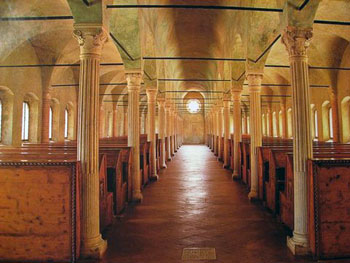March 22, 2014
Biblioteca Malatestiana – The world’s oldest public library
I’m in Cesena, Italy for the first holding of the Web Economic Forum. Because I’m only here for a day, I didn’t bother to look up the local attractions until I arrived this afternoon. At TripAdvisor, the #1 Attraction is the Biblioteca Malatestiana, so I walked there. (It turns out the WEF is in the adjoining building.)
The 400-year-old Biblioteca lays claim to being the world’s oldest public library. And it’s worth a visit, although the tour is in Italian, which I listened to attentively with my 1% Italian comprehension that consists almost entirely of false cognates and pizza toppings. Nevertheless, you can get the gist that this is a damn old library, that it’s got some very old books, including one from the 11th century, and that it was managed jointly by a monastery and the city government. (The intricate doors to the reading room require a key from each to be unlocked.)
The reading room looks like a chapel. There are two rows of pews that turn out to be reading desks designed for people to stand at. The books are stored underneath, like prayer books in a church, except they’re not and they’re chained to the shelf. The books on the right side of the chapel are religious, and the ones on the left are civic and classics. (The Greek classics are Latin translations.) The collection of 353 books includes seven Jewish works.

Photo by Ivano Giovannini, from here

Photo by Ivano Giovannini, from here
Then you are taken into the Pope Pius VII’s library, a well-lit room with 15th century music books on display. They are nicely illuminated. There’s also a small display of small books, including one that they claim is the smallest that is legible without a magnifier. I couldn’t read it, but my eyesight isn’t as good as it never was.

Photo by Sally Zuckerman, from here
I wish they had shown us more of the Library, but you can hear very old voices there, and they’re mainly saying, “Printed books are going to kill reading! Everyone’s a reader now! You don’t need any special skills or training. And the books are so much uglier than they were in my day. Hey you kids, get off of my fiefdom!”
The Wikipedia article isn’t very good. There’s better info on this Consortium of European Research Libraries page, and this Travel Through History page by Sally Zuckerman. (The photos are from Sally’s post.)








